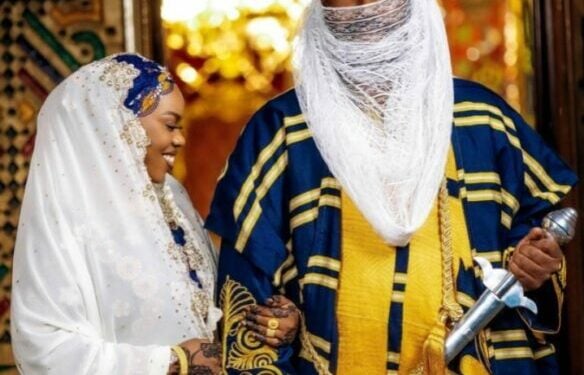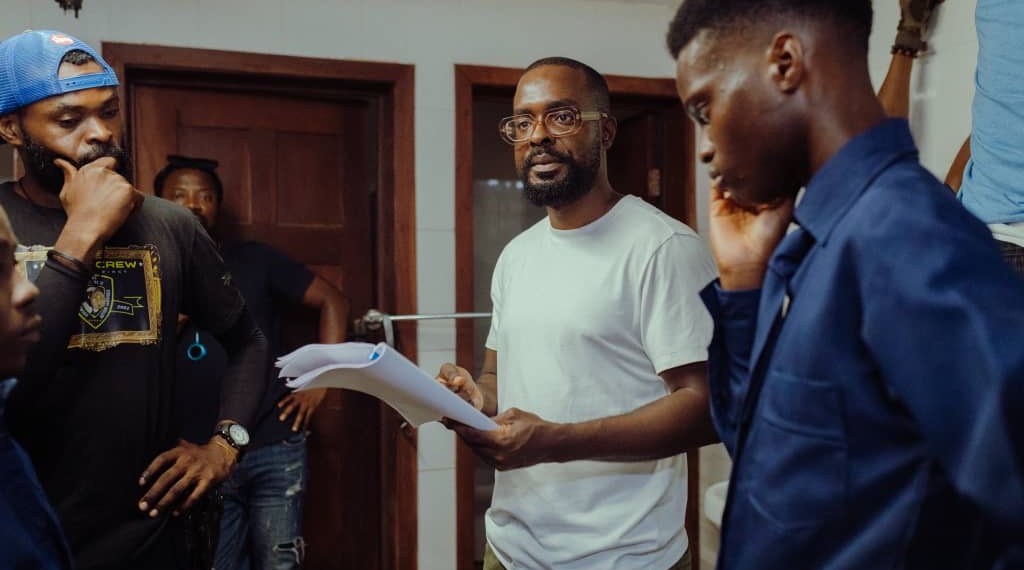After years of raising eight children on his own, Moses Amiebenomo—better known as the “Celebrity Carpenter” and CEO of Sagesse De Dieu Ltd—has found love and companionship once again. His recent engagement to Princess Aisha has taken Nigerian social media by storm, with colourful photos and heartfelt messages garnering widespread attention.
The celebratory occasion captured the hearts of many, as images circulated showing the couple and Amiebenomo’s eight children decked out in coordinated outfits, radiating happiness and unity. The story, in a country where blended families often face unique challenges, has resonated with numerous Nigerians and West Africans who find inspiration in tales of persistent hope and new beginnings.
On his verified social media page, Amiebenomo expressed deep gratitude for Princess Aisha’s acceptance, writing: “She accepted me with my 8 kids, my flaws, my weaknesses, my childishness, my bad mouth, my stubbornness and my imperfections as an angel would. I love you Princess Aisha, it’s forever or nothing baby.”
The significance of their union extends beyond personal happiness—many Nigerians have commended Princess Aisha for her willingness to embrace a ready-made, large family and praised the couple’s openness. According to relationship coach Tolu Akinyemi, “Their story breaks the stereotype that Nigerians are unwilling to consider marriage partners with multiple children. It highlights love built on character and companionship, not just circumstances.”
Anticipation for a Royal Celebrity Wedding
The couple’s wedding is slated for October 11, 2025, in the nation’s capital, Abuja—a date that is reportedly sparking excitement throughout the entertainment industry. Plans for a grand celebration are already underway, with sources close to the family alleging that numerous high-profile celebrities are expected to attend. The union is already being described as a fusion of tradition, celebrity, and communal joy, with local media outlets such as Pulse Nigeria and BellaNaija reporting strong interest from wedding vendors and event planners.
“This is not just a wedding—this is a symbol of blended families, resilience, and renewed hope for many single parents out there,” said Abuja-based family therapist Grace Udeh. “It challenges social stigmas and opens a conversation about love and acceptance in modern Nigerian society.”
From Carpentry to Community Empowerment
Amiebenomo’s story is remarkable not only for his personal milestones but also for his professional achievements. Recognised for producing world-class furniture accessible to everyday Nigerians, he led Sagesse De Dieu Ltd to become a household name. According to a 2023 Guardian Nigeria profile, Celebrity Carpenter’s business philosophy revolves around affordability, quality, and empowering local artisans.
His commitment to social impact extends into education. Amiebenomo established Africa’s first traditional carpentry school, equipping young Nigerians with the skills necessary to thrive in a competitive labour market. Industry observers, including Lagos-based vocational expert Samuel Taiwo, note that such initiatives address Nigeria’s high youth unemployment rate, which, according to the National Bureau of Statistics, stood at an estimated 40.6% among young adults in 2023.
The founder’s innovative training model, launched in the Dei-dei community, has offered a lifeline to many families. Last year, he enrolled a significant number of children—especially those from underprivileged backgrounds—into his Carpentry Academy, marking the first time such an institution has operated in Nigeria. Local mothers interviewed by grassroots journalist Ngozi Chukwuma stated that the programme “brought peace of mind, knowing our children are learning a valuable trade and staying off the streets.”
- Youth who graduate from the Academy reportedly have higher job placement rates than peers from traditional schools.
- The training includes business management modules, empowering students to become entrepreneurs and employers.
- Alumni testimonies highlight improved family wellbeing and increased community income.
Social Impact and Recognition
Beyond technical education, Amiebenomo is recognised for his humanitarian outreach. According to reports, his relief initiatives during periods of economic hardship—such as distributing food items, materials, and scholarships—have directly impacted hundreds of households in Abuja and its environs. Residents like Amina Bala, a single mother, noted: “His support gave us hope during a challenging time. It’s not every day you see business leaders give back without expecting anything in return.”
In recognition of his service and empowerment work, community elders last year bestowed upon him the traditional title of Garkuwan Matasa (Guardian of the Youth) of Fillin-Dabo Dei-dei in the Federal Capital Territory (FCT). This honorific acknowledges Amiebenomo’s significant efforts to uplift young people and is reserved for individuals whose service has left lasting positive change. According to Chief Mallam Musa Abubakar, the leader who presided over the ceremony, “He has made our youths proud and shown them what is possible with determination and skill.”
Challenges and Broader Implications
Despite these successes, Amiebenomo and others working in vocational empowerment highlight ongoing challenges. Funding for skills training often depends on private philanthropists or sporadic government grants. Many experts, such as Professor Charity Ekaete of the University of Abuja, argue that “sustained governmental support and targeted investment in vocational education will be crucial to scale successes like those of Celebrity Carpenter to the national level.”
Furthermore, questions remain about the replicability of this model across other West African contexts. In Ghana, for example, technical and vocational education reforms are ongoing, yet face obstacles related to curriculum, funding, and public perception. Regional cooperation, data sharing, and the involvement of both public and private sectors could help consolidate lessons learned from Nigerian initiatives for broader African impact.
Local and Global Significance
The story of Moses Amiebenomo illustrates the transformative potential when business leadership and community development intersect. As social entrepreneur Nana Kofi Owusu (Accra, Ghana) notes, “Empowering youth with practical skills tackles unemployment at the roots. We need more such role models across West Africa to build a resilient, future-ready generation.”
International organisations like the International Labour Organization (ILO) have repeatedly called for a focus on vocational skills as an avenue for inclusive growth across Africa. They cite initiatives such as Amiebenomo’s as instructive for policymakers and development agencies.
As preparations for the October 2025 wedding continue and congratulatory messages pour in, the blended Amiebenomo family stands as a testament to resilience, acceptance, and hope. Their experience underscores the power of community—whether in business, education, or personal life—to foster lasting change.
What unique challenges or support systems have you seen in your community for single parents and blended families? Share your perspectives below and follow us for more inspiring stories from Nigeria, West Africa, and beyond.
For general support, reach out at support@nowahalazone.com.
Join the conversation and follow us on Facebook, X (Twitter), and Instagram for more updates and human-interest stories across Africa!









